Contents
If I had to pick one operating system of the year, I would be picking Ubuntu MATE 16.04, if Solus hadn’t come along and stolen the title.
If it was a contest (and let’s admit it; it is.) this would be nothing short of a gripping and dramatic victory for Solus’ lead developer Ikey Doherty and team, especially in this new generation of proven and truly great Linux systems. If it wasn’t for the fact that the Linux community at-large was full of such amazing and cooperative people, I would call it a distro war.
Now, before I get called out for trying to “sensationalize”, let’s get something straight. In recent weeks I have heard the words “competition” and “competitors” used more in the interchange of “fellow developers of other distros” than I have ever heard in my years of involvement with open source.
And I’m proud to say that I welcome it with open arms. Nothing makes you better than someone trying to outdo you. At the moment, no one is trying to outdo you like Team Solus, so you’d better eat your Wheaties.
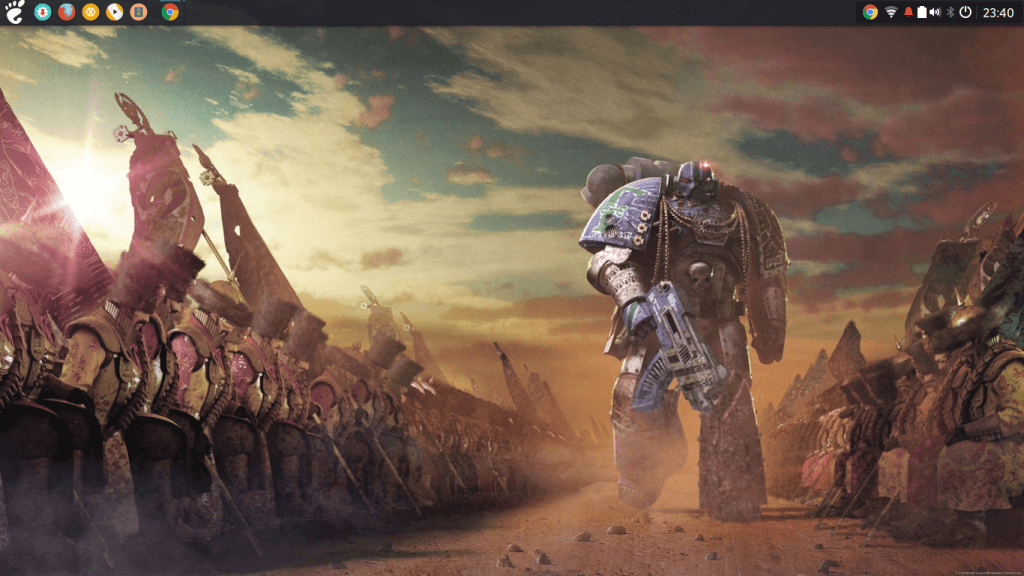
They’ve Been Win-ning!
If you’ve used Solus at all in the past couple of months you’ve probably noticed a deluge of changes and bug fixes. I feel as though I’ve been watching a day and night construction of the Winchester House; only this time it’s not out of fear of ghosts and the stairs being added actually lead somewhere.
It’s been an amazing (and sometimes startling) experience. Anyone who read my initial Solus review will probably remember my misadventure with Wine, where I was trying to get a Windows MUD client to load. My reaction was genuine. I was writing in real time. One minute I was testing the client in Solus and it wasn’t working. A few minutes later I tried it again, using the same method as before and it worked. I was able to play Aardwolf on Solus and it was like getting a present. Is there a Betty Ford for MUDs, by the way?
Many, many improvements have occurred since those heady days of development by Ikey and the gang. Most recently, with the 1.2.0.5 release, some of the tightening up includes a fix for a slightly annoying battery icon refresh issue and some keyboard region “guess” issues.
They also switched over to Gnome screensaver for screen locking and for better power management. Somewhat infamous installation issues for the Nvidia Maxwell cards as well as the Intel Skylake chip series were addressed. Gnome technology stacks for 3.20 were added as well as Ikey’s favorite PulseAudio 9, Mesa 12, GCC 6.1.0 and glibc 2.2.4.
If you’ve ever been curious but afraid to try installing it yourself, Solus saved you the trouble of installing the latest Linux kernel, 4.7.2. So far my experience has been really terrific and I’ve not run into any issues in these regards.
I’ve Got to Run, Run Like the Wind…
I like an OS that doesn’t mess around and Solus definitely gets to the point and sings in the startup and shutdown departments. Even on my recently modified Acer Chromebook 15 with SeaBIOS it boots up in 13 seconds. You read that right. Even with Numix icons installed and having to select Solus on GRUB. There’s even an optimistic little “Doong-doong-doong!!” chime once the desktop appears Shutdown? Four. That’s applause-worthy.
Apps start up very quickly, with even Google Chrome beating the clock. So even on low-spec systems, you can really sense the drive for a great desktop experience. It’s light, but pretty. It’s fast but doesn’t skimp. It’s easy; even if you’re the laziest desktop user on the planet you can get what you need without having to go spearfishing on the Internet.
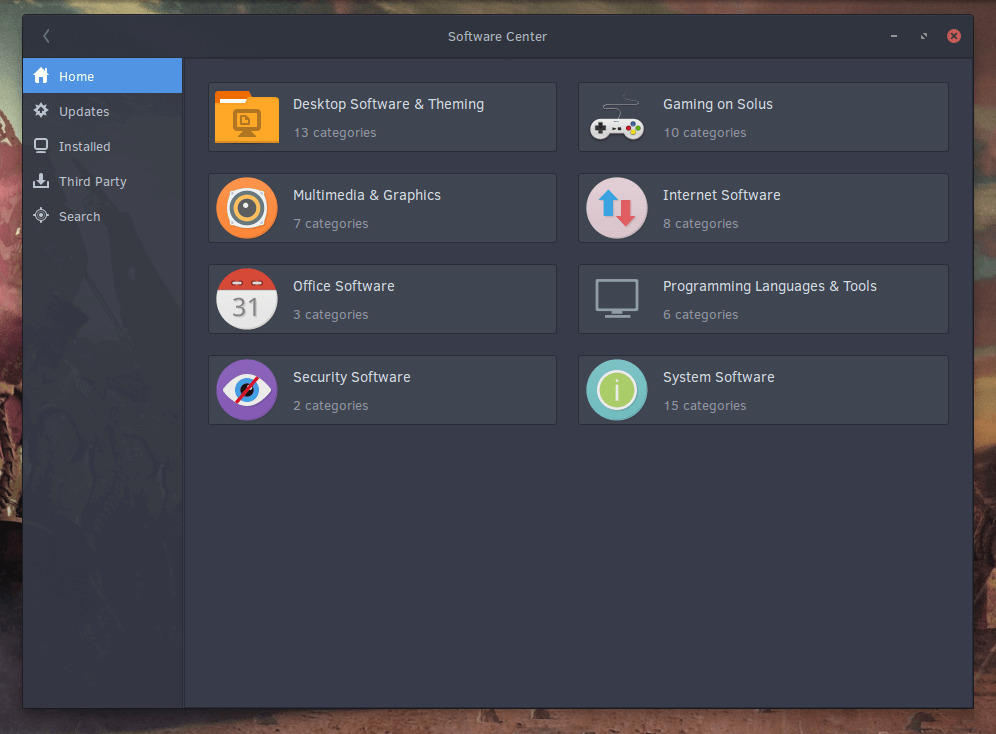
Beavis Installs Packages
In the Solus repo, you’ve got a slew of new packages ready to go whenever you want them. In fact, 41 were introduced, however many of those fulfill several software dependencies for installing others. However, those are easy to spot since they use a “brown postal wrapper” icon. Another thoughtful touch is Solus’s way of understanding that you’re pretty busy and don’t have time to look through all your package dependency issues. Amazingly and very faithfully, Solus follows through by letting you know up front to the effect of “This package requires these others so it can work and work well.” So there’s little-to-no chance of me screwing this up. So far, all of these dependencies have been satisfied and I’m running my packages so well they’re impressing the living dead out of my family. Then I told them that it’s the genius of Solus and not me and they all went back to watching whatever was on Hulu at the time.
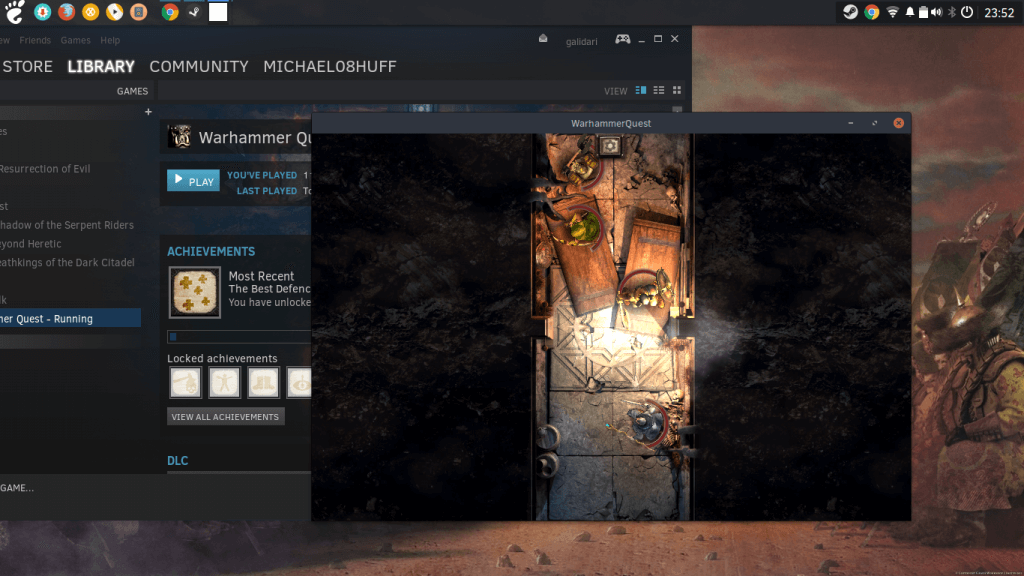
You Think I’m Playing Games Here?
Actually, I am for a change. And I’m having a great time with the emulators that are ever-so-conveniently contained in the repo. Of course, I’m going to give them a try because they’re there for, you know, development. And I’m going to try the mGBA emulator out with my ro…backups. This is science, for Heaven’s sake!
Even on a 5th-gen Celeron the frames are something to write home about. Of course it’s GBA, so we’re not exactly burning down the house. It is clear that when they chose an emulator for GBA, they chose wisely.
There are several others here, including the amazing snes9x-gtk, which will always have a special place in my heart. If you’re an old-school gamer, it’s a treasure trove.
Solus also comes with the latest possible version of the Steam client, with which I installed my copy of Warhammer Quest. This game has some relatively low spec requirements but the frame rates and rendering were really smooth, even with the settings all the way at 11. I’m having to tear myself away because this is one of my favorite turn-based RPGs.
I guess the point here is that if you want a gaming system, Solus is up to the task. And just because something you want doesn’t work today, that does not mean that it won’t work later. I can tell you from personal experience. These guys will spring the development on you.

Whole Kernel Porn
It may be just “an interesting choice” for many that team Solus chose to use the latest Linux kernel full-time. Way to be reserved because I’ve never been more excited about it. For a long time, I’ve wanted to fearlessly use the latest kernel because…well…all the other big Linux guys were doing it. Plus, I keep reading about the advantages (and potentially broken things) that follow a kernel update. I’ve been burned before. Like when I was dumb enough one time to upgrade the kernel in Mint.
One of the advantages of having the latest kernel is security, having the latest drivers for third-party video card support, speed and stability. Well, that last one can vary from distro-to-distro. But it provides a better foundation from which a developer can work, particularly if they’re really going hard at it.
It’s also a bit of a risky maneuver, since so many things can go wrong. Essential packages can fail to load and you end up with a broken system until you boot into recovery mode and roll the kernel back. The way the Solus team has approached this is that it gives them little-to-no excuses to turn up something that doesn’t work. In short, you can see that these guys are putting their time in. I’ve yet to run into a brick wall with Solus and I’ve tried many, many of these packages. Maybe I just hit it at the right time or maybe they don’t sleep. I don’t know. But the experience is anything but disappointing. If you’re the type of user who spends a lot of time in the gui and doesn’t really like to touch the Terminal, no big-no big at all. We keep going back to the reason Solus exists and that is to give the user the best desktop experience possible.
That’s not to say that the harder of core can’t have fun with the Terminal. No, no, no. This is Linux. And if you want to compile your own packages and do your own development (maybe contribute some stuff to the Solus gang) then get right to it. Development tools are right there in the repo. If you’re a Perl guy, like me, you’ll be welcome with a tip of a hat. You don’t see Perl anymore! Huh!
G’day MATE!
This much beloved desktop environment was added recently thanks to the expanding use of Gnome via GTK3. It will be provided as an installation option and a Solus MATE edition will also be released, of course MATE being the default.
Interestingly, the team has gauged the possibilities of future desktop environments down the road, some a lot more than others. These are GTK lovin’ guys so it’s not really likely that a KDE Plasma version is in the cards yet-as unbelievably interesting as that would be. But it’s a good idea to keep your scope in check since the development team is still pretty small and ambitions are high. So at the moment, it looks as though development is confined to Budgie and MATE.
I like that, though. Scope creep is a huge enemy of any project. If Solus was a rock band, they’d want to experiment without going full-on pop. They want their appeal to come from the merit of their own efforts and remain as pure to the original product as possible. They want to please everyone who crosses the already established bridges. I believe this is the best approach for something as original as Solus. There just aren’t many independent efforts like this around these days that have this kind of momentum. They way they’re handling development can assure a tight cult following with the potential for mass appeal. Time will tell, but as I wrote in my first Solus review, I wouldn’t be surprised to see Solus derivatives begin to form as the original continues to expand and galvanize.
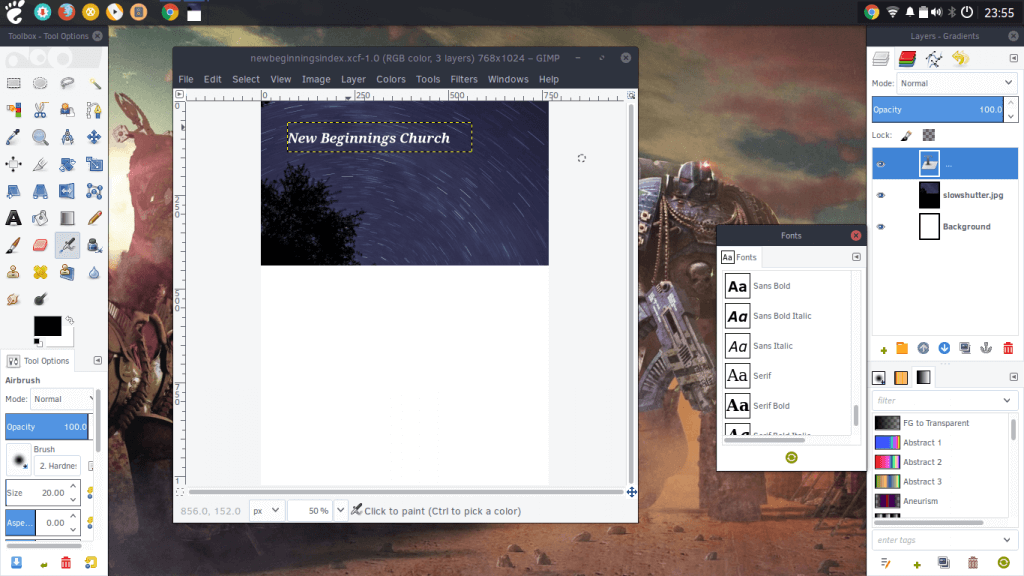
Time in the Sun
The more I use Solus, the clearer it becomes that it’s a desktop.. It’s cutting-edge but highly accessible. It’s elegant and in a class by itself, but not hostile to varying desktop environments. It’s slick, but not slippery. It’s polished and fun but still has seriously powerful elements. It’s for work and play. While it’s true that there are no perfect distros, this team has done a masterful job at creating something so close to that.
I now have Solus installed on both of my main systems. I’m getting the same feeling I got when I found Ubuntu. I can work with it because it allows me to do so with speed, low system overhead and enough complexity on the back-end for when I’m in full-on geek mode.
I can say that the only people who need to use Solus are those who value their happiness in computing. When I’m trying to work on something important, I don’t want to be bogged down feeling like I’m finishing the developer’s job. I don’t always have time to go searching through websites to do something as simple as trying to remote into another system or to do something as simple as install an icon pack. Maybe I’ve just not run into the situation yet. But again, there are no perfect distros.
Maybe that places me on the more creative end of the spectrum than the scientific end. Fine. But it’s great to be there with Solus around. Dare I say..? Dare I? We finally have the power and ease-of-use of a Mac in a Linux distribution.
And it’s still growing. Wow.





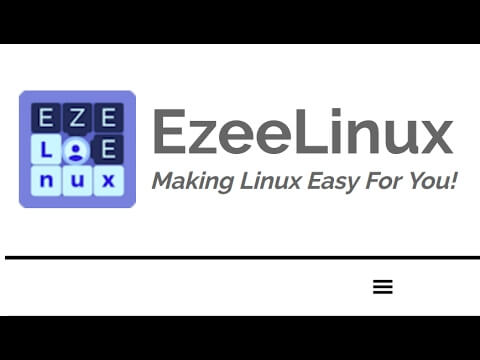


Solus is my daily OS and rolling with the greatness
What a great article. I’ve been with solus since day 1. All the way back when it used to be called Evolve-OS, and I’m still as happy as can be. For the longest time, Arch Linux was my first choice when it comes to Linux. But times, they are a changing. 🙂
https://github.com/solus-project/budgie-desktop/issues/164
Maybe they can start working on some basic Budgie functionality now.
This distro looks very tempting, it have many of the features I like. However I have had my fingers burnt in the past. Some shiny project with a small dev team revolving around a single person. Burnout is real, how long before we see a news post about having to step back sighting stress and overwork? I have seen it before and because of this I’ll give this distro some time to mature. I have no fear for the stability of the software, but the “bus factor” of such a small team is too high for me to be comfortable.
Well nowadays we have alot of such small teams around a single person doing great distros like martin wimpress with ubuntu mate and daniel fore with elementary. Of course we also still have Clem with Linux Mint. I believe if the team is well funded by their community, there is less chance of burnout.
Suggesting that these distro’s like Ubuntu-Mate, Elementary or Mint are comparable to Solus is missing one massive thing. Canonical and the Ubuntu bases those distro’s use. The Distro’s you mention are Ubuntu base + DE, Solus is a whole distro not based on any other. I use Ubuntu-Mate, partly because I like the work Martin dose but mainly because it has Canonical standing behind it. Solus is a completely different type of project, the small team making Solus has to way more than just tack a DE on a pre-existing, working, commercially supported distro. I’m not running these distro’s down but Martin himself freely admits that Ubuntu-Mate is his hobby! That he works on in his spare time. This “hobby” has resulted in getting a job at Canonical. We get a great version of Ubuntu, but it is just that, a Ubuntu derivative.
There is something called the “Bus Factor” how resilient to failure is a project if the lead developer is run down by a bus. My concerns with Solus are that if something happens to the lead dev the project dies with him. Now this is very dramatic much more likely is the he get up one morning and decides that this is not fun any more and kills the project or worse still just stops contributing.
Lets see if Solus is still around in a couple of years, then we can look again.